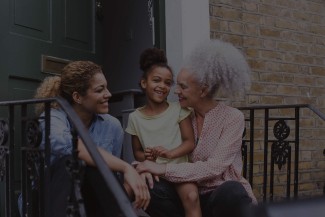
Centering Housing Justice and Health Equity in Building Decarbonization
This issue brief from the Building Energy, Equity, and Power coalition (BEEP) provides historical context about how racist policies and practices created current disparities in the housing market and offers policy recommendations for creating equitable building decarbonization programs. It also highlights programs that seek to remedy health and housing disparities for the most impacted populations while also addressing the climate crisis.
Inflation Reduction Act Can Help Decarbonize Without Displacement
Are you interested in learning more about how equitable building energy retrofit programs can advocate for renters? This resource, from the Climate and Community Project (CCP) analyzes how Inflation Reduction Act (IRA) provisions can help or harm renters and outlines steps to create a more safe, healthy, and affordable housing system.
Centering Housing Justice and Health Equity in Building Decarbonization
This issue brief from the Building Energy, Equity, and Power coalition (BEEP) provides historical context about how racist policies and practices created current disparities in the housing market and offers policy recommendations for creating equitable building decarbonization programs. It also highlights programs that seek to remedy health and housing disparities for the most impacted populations while also addressing the climate crisis.
State Energy Offices Can Maximize Home Energy Upgrades and Savings
This article from RMI provides guidance on how states can combine different federal incentives from the Inflation Reduction Act (IRA), fill funding gaps, and design home energy upgrades programs that efficiently and comprehensively deliver whole-home retrofits.
Guidelines for Maximizing the Benefits of Federal Investments in Buildings
This new resource provides a starting point for policy makers designing equity-driven building energy retrofit programs that will benefit from Inflation Reduction Act (IRA) and the Infrastructure Investment and Jobs Act funding (IIJA). It highlights funding opportunities, barriers to accessing funding for low- and moderate-income communities, and guidelines for equitable program design. The resource was created jointly by Elevate, the Building Electrification Institute, Emerald Cities Collaborative, the Greenlining Institute, Greenlink Analytics, Rising Sun Center for Opportunity, and NRDC.
Need Help Planning Energy Upgrade Programs for Low-Income Housing in Your Community?
Are you part of a state or local government, community-based organization, or other entity working to scale up energy upgrades of low-income housing in your community? Could you use some help? R2E2 is working with communities to jumpstart upgrades for single-family and multifamily affordable housing, especially in frontline communities. We want to hear directly from you: Would you like to be considered for help from R2E2 to plan, launch, implement, or scale your energy upgrade program? If you would, please complete our 10-minute survey by March 1. As R2E2 secures funding for this work, we will consider and engage those who complete the survey. Our goal is to provide grants to participating communities in addition to technical assistance. We particularly encourage those who have completed some level of planning for their upgrade program to complete the survey. Please note that this technical assistance pertains to programs, not individual buildings.
Federal Efficiency and Electrification Rebate Programs
Are you interested in learning how community-based organizations and local government officials can help shape states’ energy efficiency and electrification rebate programs? Under the Inflation Reduction Act (IRA), state energy offices will design and implement the programs, but local retrofit program administrators can play an important role in marketing these programs, coordinating projects, stacking multiple funding streams, and possibly applying for and receiving rebates on behalf of eligible households. This resource provides an overview of the Department of Energy’s Home Efficiency Rebate Program (Section 50121 of IRA) and Home Electrification and Appliance Rebate Program (Section 50122 of IRA) and identifies areas where states have flexibility to adapt these rebate programs to best serve low-income and multifamily households.
The AFFORD Tool for Navigating Federal Funding Opportunities and Decarbonization Resources
The AFFORD tool, an external resource developed by RMI and the World Resources Institute as part of Bloomberg Philanthropies’ American Cities Initiative, is designed to help users navigate and prioritize federal funding, tax credits, and other incentives. The free tool includes information on 248 different sources of funding and incentives, some of which can be used to implement building energy upgrades. The tool provides filters to help you identify funding and incentives that are relevant to your project, goals, and community.
C40 Knowledge Hub's New Resource on Maximizing Federal Climate Investments
This external resource, developed by Climate Mayors, the Urban Sustainability Directors Network, and C40 Cities, illustrates the roles that cities will play in implementing the Inflation Reduction Act and the 2021 bipartisan infrastructure law. It includes guidance on supporting and partnering with frontline communities and community-based organizations. It also identifies the tools and resources local governments need to deploy federal climate funds and recommends how federal agencies, state governments, funders, and climate advocates can accelerate this process.
R2E2 to Support Winners of Transformational U.S. Building Energy Retrofit Prize
Thirty-nine teams that were awarded federal prizes to bring energy upgrades to affordable and other equity-eligible buildings will receive critical guidance and coaching from the Residential Retrofits for Energy Equity (R2E2) initiative. R2E2 will work with today’s winners of the U.S. Department of Energy’s Buildings Upgrade Prize to develop innovative building energy retrofit plans and access funding from the Inflation Reduction Act and other federal, state, and utility incentives to bring energy retrofits to underserved communities. Read More
Federal Funding FAQs
You ask, we answer! In our Resources section, we address questions R2E2 has received related to new federal funding opportunities to support energy efficiency retrofits of low- and moderate-income housing. These questions are largely focused on programs made available through the Inflation Reduction Act of 2022 (IRA). Have questions related to federal funding? Send them to our team via the link below! We’ll be updating this list as we receive new questions.
The Green and Resilient Retrofit Program (GRRP)
Interested in learning more about the Department of Housing and Urban Development's Green and Resilient Retrofit Program (GRRP)? R2E2 has assembled a short resource intended for states, local governments, retrofit program administrators, and community-based organizations (CBOs) looking to support HUD-assisted, affordable multifamily housing owners in pursuing energy efficiency and resiliency upgrades as part of their recapitalization projects. If you have any questions related to this resource, please submit them on the Stay Informed tab.
Events
Check back soon for information on upcoming events about energy upgrades for affordable housing.
